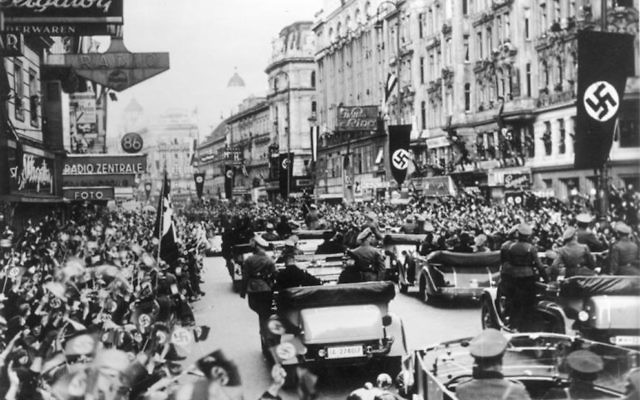The tragic legacy of the Anschluss
I was born on February 11, 1938, in Vienna. Barely one month later, on March 12, 1938, Nazi Germany invaded Austria and within hours Hitler had proclaimed the Anschluss.
I WAS born on February 11, 1938, in Vienna. Barely one month later, on March 12, 1938, Nazi Germany invaded Austria and within hours Hitler had proclaimed the Anschluss (the annexation of Austria by Germany) in front of hundreds of thousands of flag-waving enthusiastic Austrians.
The Anschluss took place 80 years ago. This year is also the centenary of the Treaty of Versailles as well as 170 years since the beginning of the reign of Franz-Josef I (1848-1916), the last emperor of the Austro-Hungarian Empire. In hindsight, it is interesting to reflect on the significance of these dates and their effect on European history.
1848 marked the beginning of arguably one of the most prosperous periods in the history of Austria. By the beginning of the 20th century Vienna, the capital of the empire, was considered the most modern capital city in Europe. It was a city of two million people enriched by the cultures of the vassal states to the east with a vibrant middle class of merchants, bankers and financiers.
In 1910 there were no less than 3000 cars on the streets of the city and the advances in technology, medicine and the natural sciences had begun to make life easier for the average citizen.
Under the protection of the Hapsburg Emperor Franz Joseph I, millions of Jews lived in the vast central European domain of the Austro-Hungarian Empire. The emperor said “the civil rights and the country’s policy is not contingent in the people’s religion”.
By his personal decree, Jews enjoyed a greater degree of emancipation than ever before and were largely protected from persecution. As part of extending human rights to all his subjects, Jews had freedom of movement and residence, were permitted to own land, and were able to work in the public service and the professions.
Approximately ten per cent of Vienna’s population was Jewish and the city came to be known as the most ‘Jewish’ capital in Europe. Academics, artists, composers, designers and even sportspeople achieved recognition, and Jews were also prominent in business and finance.
However, in spite of their significant contribution to the prosperity and culture of the state, anti-Semitism was endemic in all sections of society, and many Jews chose to assimilate or convert in order to advance their professional careers and/or their social standing.
When the heir to the Hapsburg Empire, Archduke Franz Ferdinand, was assassinated on June 28, 1914, by a Serbian Nationalist in Sarajevo and Austria declared war on Serbia, nobody could have predicted that soon after the world would be at war.
The ‘war to end all wars’ had major repercussions for Europe.
At the end of the World War I, the Treaty of Versailles saw the disintegration of the Austro-Hungarian Empire that had encompassed most of central Europe since the 13th Century. Poland was again an independent country as were Czechoslovakia, Hungary, Romania, Yugoslavia and many other former vassal states.
Vienna was now the capital of a new Republic of Austria with a population of only six million people instead of the fifty-two million that had made up the old empire. Political upheaval together with the economic hardship of the Depression resulted in a further destabilisation of society and serious social unrest soon followed.
Similar political and economic dissatisfaction in the neighbouring Weimar Republic of Germany encouraged the rise of radical right wing parties who found popular support for their anti-Communist platform, their objections to the Treaty of Versailles and their anti-Semitism.
When Hitler became Chancellor in 1933 the Third Reich not only systematically violated the military and financial terms of the Versailles Treaty, but immediately imposed a nationwide boycott of Jewish shops, doctors and lawyers. The descent towards the annihilation of European Jewry had begun.
Article 80 of the Versailles Treaty stated, “Germany acknowledges and will respect strictly the independence of Austria within the frontiers which may be fixed in a treaty between that State and the Principal Allied and Associated Powers …”
This did not prevent Hitler agitating in Austria, the country of his birth, and his next step was to unite the two ‘German’ speaking countries.
The German invasion of Austria on March 12, 1938, was Hitler’s first act of open aggression against an independent sovereign nation.
After the Anschluss, the anti-Semitic policies that had already been implemented in Germany were immediately introduced in Austria. Jews were expelled from all cultural, economic and social life; they were hounded on the streets, their property was confiscated and many were summarily imprisoned.
Faced with an intolerable situation at home those who had connections or independent means sought refuge abroad little knowing that most would never again see the relatives and friends they left behind.
Approximately one third of Austria’s Jewish population perished in the Holocaust. Those who managed to get out on time were, in the words of my father Karl, an internee in Tatura, “spread out in every direction of the wind”.
They took with them the culture and ideas of the country of their birth; they re-established their lives and careers and many made significant contributions to their adopted homelands.
Their children and grandchildren have been absorbed into the dominant culture and now only recognise their Austrian heritage through the Apfelstrudel and Marillen Knödel.
Today many historians agree that if the Allies had halted the advance of the Third Reich when it flagrantly violated the terms of the Treaty of Versailles on March 13, 1938, Hitler’s subsequent invasions of Czechoslovakia and Poland may not have taken place, and the Second World War with its dire consequences may have been avoided.
That is the sad legacy of the Anschluss.
EVA DE JONG-DULDIG is the founder of the Duldig Studio. Her memoir Driftwood was published last year.


comments